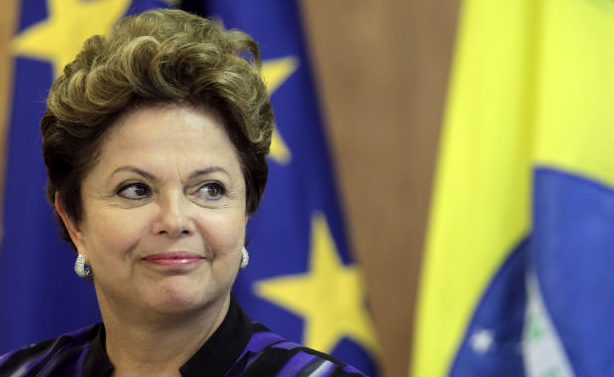
This week, Dilma Rousseff is in Russia to participate in the 7th BRICS Leaders Summit in the city of Ufa. Together with her visit to Washington D.C., a week earlier, it is the most important week for Brazilian foreign policy this year.
With severe budget cuts in the Foreign Ministry, lacklustre regional ties and a relationship with the United States in search of meaning, Brazil’s BRICS membership is one of the few bright spots of Brazil’s foreign policy of the Rousseff administration. It provides Brazil with privileged access to both China and India — not merely through two yearly encounters with its leaders, but also due to a growing number of institutionalized intra-BRICS activities in areas as diverse as agriculture, education, public health and economic development. Most importantly, the creation of the New Development Bank binds Brazil to Asia’s leading economies in the long term, a crucial benefit considering that region’s growing importance.
The cost of BRICS membership is low as it does not negatively affect Brazil’s other partnerships. Brazil’s interest in seeking closer ties to OECD is a case in point, and little suggests Brazil could not be member of both clubs at the same time. In the same way, being a BRICS member does not reduce the chances for a trade agreement with the EU, or a revival of relations with the United States. If anything, BRICS membership may strengthen Brazil’s bargaining power with other actors.
That does not mean, however, that the 7th BRICS Summit is free of risks. Increasingly anti-Western, Russia may seek to politicize the BRICS meeting further and use it as an anti-Western platform, particularly if the European Union’s sanctions will be renewed in late June. Russia is also likely to propose a series of ideas ahead of the summit that are likely to generate strong criticism in the West, such as arguing for the UN’s International Telecommunication Union (ITU) to replace the US government as the ICANN overseer. Many critics of this idea say that it would allow authoritarian regimes to challenge the open Internet. While China is supportive of the idea, Brazil is unlikely to go along, considering its leadership on the matter at the 2014 NetMundial in São Paulo.
Tone down the rhetoric
Brazil’s challenge at the summit is thus twofold. First, it must work towards softening the language of the final declaration to assure that the BRICS grouping will not be perceived as an anti-Western grouping. That includes avoiding, for example, expressions of support for Russia’s position vis-à-vis the Ukrainian Crisis — such as calling Russia’s annexation of Crimea a ‘reunification’. In the same way, Brazil will have to temper any language that proposes the ITU as the governing body of the internet. More broadly speaking, the 7th BRICS Summit may be a good opportunity for the other members to show that their willingness to tolerate Russia’s more confrontational behavior is not limitless. As Russia is facing long-term estrangement from the West, the BRICS countries (and primarily India and China) will be increasingly important allies for Moscow, indispensable for keeping Russia economically and diplomatically connected to the rest of the world. That enhances their capacity to influence Russia’s foreign policy, and none of the other BRICS has any interest in a lasting system-wide confrontation between Russia and the West.
Keep it technical and focus on growth towards the inside
The second challenge is to focus on the so-called “growth towards the inside” and strengthen ways to enhance intra-BRICS cooperation according to Brazil’s interests. As the Brazilian government is rethinking its role in the global economy and abandoning its more protectionist stance of the past decade, facilitating intra-BRICS trade, discussing the adoption of common technical standards, and eliminating bureaucratic obstacles to intra-BRICS travel and investment would be important steps. Intra-BRICS trade was grown at extremely high rates over the past years (albeit from low rates), but absolute figures, particularly when excluding China, are still insignificant. Today, intra-BRICS cooperation is far more institutionalized than Brazilian public opinion is aware of. Tellingly, in today’s Folha de São Paulo, a page-long article (A5) covers the visit of the Brazilian delegation to the first meeting of BRICS parliamentarians in Moscow, yet rather than discussing the encounter itself, it focuses on who paid for air travel and hotels.
Together with India and South Africa, Brazil must also assure that the New Development Bank (NDB) provides institutionalized channels to engage with civil society and respects strict environmental and human rights standards. Insisting on such mechanisms and avoiding that the BRICS-led bank merely follows China’s lead is Brazil’s responsibility — and if coordinated properly with India and South Africa, chances for success are significant.
Finally, stronger intra-BRICS cooperation also entails discussing ways to go forward in the reform of international financial institutions like the IMF and the World Bank. In 2012, the BRICS failed to unite around a common candidate to replace the heads of both institutions, and Europe’s and the United States’ dominance continued. What can the BRICS grouping do to avoid such a scenario in the future? These are the types of discussions Rousseff should initiative in Ufa.
Brazilian foreign policy makers should thus try to make the declaration as technical as possible, and focus on a series of small steps that strengthen intra-BRICS ties in tangible ways. That may lead many commentators to argue, as they have over the past years, that the BRICS grouping is unable to find a common denominator on big issues. Yet given the highly divisive current macroeconomic environment, focusing on pragmatic steps to enhance cooperation is likely to be the best way forward.
Read also:
Why the BRICS grouping matters more than ever
Curso intensivo de inverno: Brazil in World Politics
Victory Day Parade points to BRICS grouping’s growing importance for Russia
Photo credit: Ueslei Marcelino, Reuters








